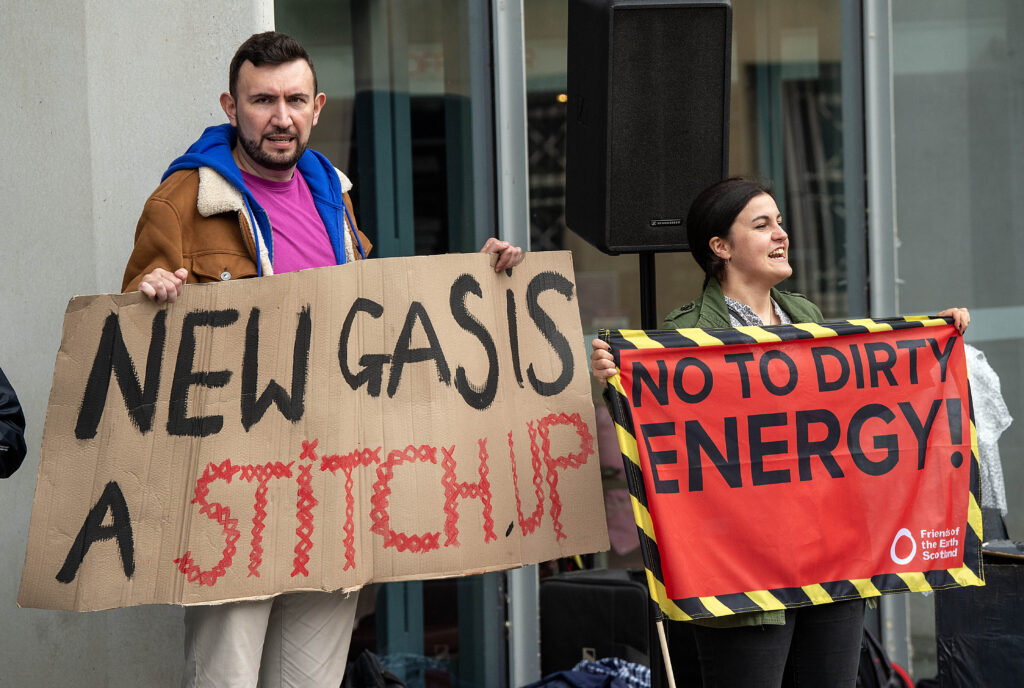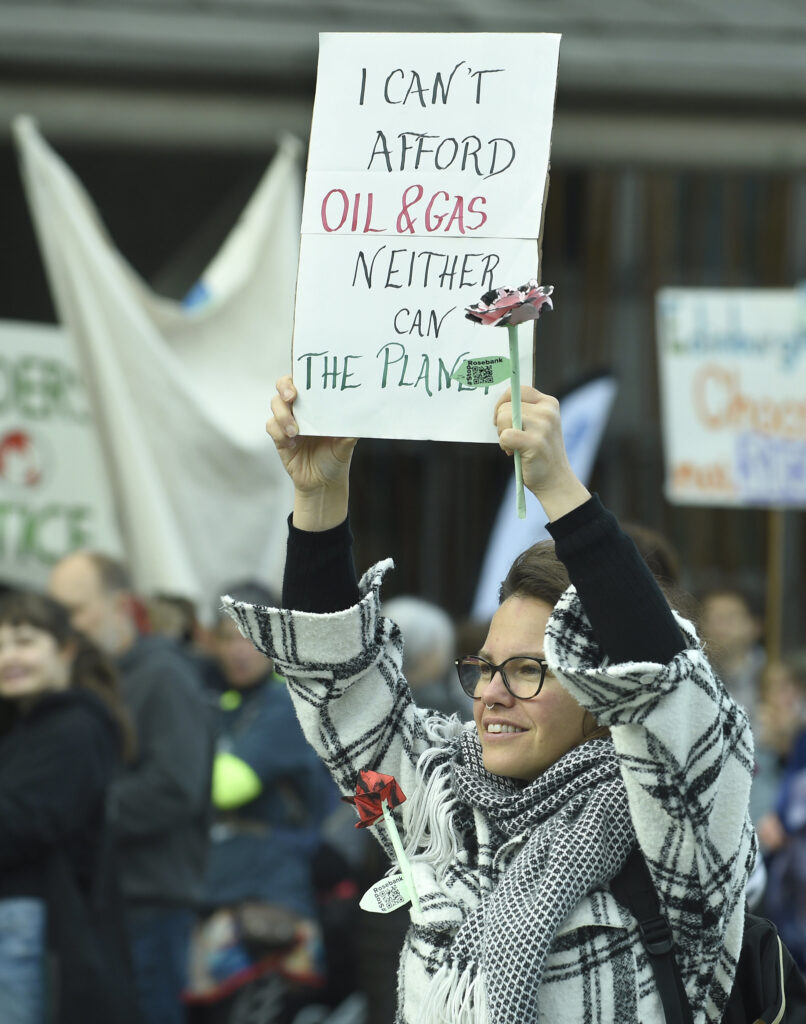
In the pocket of developers: how the Scottish Government breached its own rules 28 times in handling of new gas power plant application
Friends of the Earth Scotland has uncovered extensive evidence of secret lobbying and breaches of official rules – known as the ministerial code – over the Scottish Government’s handling of proposals for a new fossil fuel power station in the north east of Scotland.
The ministerial code sets out how ministers should act in the handling of planning applications and states that, to make sure the planning system is fair, ministers “must do nothing which might be seen as prejudicial to that process”, including by meeting developers to discuss a proposal but not meeting all interested parties.
We have uncovered 28 breaches of official rules since developers SSE and Equinor submitted their planning application for a new gas burning power station with carbon capture plant in February 2022.
Ministers cosy with developers but refusing to meet objectors
The Scottish Government repeatedly refused to meet Friends of the Earth Scotland and other objectors, claiming that it would be inappropriate to discuss “a live planning application”. Despite this, ministers, including the First Minister at the time, were briefed to discuss the issue with the power station developers on at least 10 occasions, and there is no suggestion of caution that this could prejudice the planning process.
On one such occasion Ivan McKee MSP, then Minister for Business, attended a Scottish Government dinner with oil company Equinor and other big businesses at a luxury hotel in Glasgow. He was briefed by civil servants that when speaking to Equinor to “offer your support in any challenges faced by the organisation.”
In May 2022, Michael Matheson MSP, Net Zero and Energy Secretary at that time, told the press that the proposed fossil fuel plant was “a fantastic example of how Scotland’s energy sector can make the transition to net zero”.
Last summer First Minister Humza Yousaf accepted an invite to spend the day touring the existing SSE gas plant at Peterhead. In case it wasn’t obvious enough, his own Special Advisor stated in an email that the purpose of the visit was to discuss the proposal for the new plant.
The First Minister proudly wore an SSE-branded jacket and hard hat as he toured the plant accompanied by press photographers. The First Minister went as far as appearing on a promotional video (below) for SSE saying: “what I’ve been really impressed with is their plans for the future”. The Scottish Government tweeted about the event and issued a press release.
‘Prejudicing the planning process’
Such examples are worryingly typical. In fact, on at least seven occasions, we found records of ministers being briefed to explicitly express their support for the companies involved and their investments. Such discussions will inevitably have been seen as an indication to developers SSE and Equinor that the approval of their planning application was a foregone conclusion. This has prejudiced the planning process for the power plant and as such is a clear breach of the Scottish Government’s rules, the Ministerial Code.
Attempts to influence the outcome of this process have taken other forms too. Neil Gray MSP, then Cabinet Secretary for Wellbeing Economy, Fair Work and Energy, attended a conference in Edinburgh whose lead sponsor was the “Peterhead Carbon Capture Power station” (despite the fact that the station does not yet exist). Gray appeared before the fossil fuel and energy industry to present an award on the stage. Such an appearance will inevitably have been seen as showing support for the proposal.

Ministers hold at least 61 meetings with developers
This is what we know of the lobbying that has been properly recorded but we’ve reason to believe that a significant amount of activity is simply off the record. Since the Peterhead gas plant application was lodged in 2022 we found a grand total of 61 meetings between the companies and the Scottish Government. This represents SSE and Equinor meeting the Scottish Government more than once a fortnight, an extraordinary depth of engagement between the companies and government.
Until last month, the minister responsible for overseeing the application process was Gillian Martin MSP. Having previously spent 10 years working in PR for the oil industry, Martin was made Minister for Climate Action in March 2023 and responsible for power station planning applications. In that role she met with SSE and Equinor on several occasions. On most of these occasions, minutes indicate she discussed other matters but troublingly the Lobbying Register shows that she met SSE in Aberdeenshire in September 2023 but the Scottish Government have no records of the meeting taking place.
16 missing meetings and behind closed doors lobbying
This is just one of at least 16 occasions where the Scottish Government either failed to report meetings or simply had no records of meetings with SSE and Equinor: we only know about them because of records kept by the developers themselves.
Given that these companies had a major planning application under consideration, and that the Scottish Government had repeatedly refused to speak to environmental groups about this application, the missing records are deeply concerning. We, the public, can likely never know what took place at these meetings.
There are even more places where lobbying takes place out of sight, since phone calls and online meetings without video on are not required to be recorded in the Lobbying Register.
‘Critically damages public trust’
Our investigation has uncovered more than enough evidence to suggest that the planning process has been unfair and biased from the very start: a total of 28 separate breaches of the Ministerial Code. The number of incidents show a deeply troubling pattern of behaviour right across the Scottish Government, where public concerns have been deliberately ignored to try and push through a climate damaging planning application in the interests of greedy energy companies.
This failure by the Scottish Government critically damages public trust in its ability to promote the public interest against private gain.

In the debate over Scotland’s just transition, big corporations and big oil are dominating the Government’s approach and shaping decision making to suit their profits. This is particularly harmful in the Peterhead case because the projects risks locking home energy bills to the volatile cost of fossil fuels for the next 25 years or more. Peterhead will burn fossil gas which is bought at the price set by the international market and prone to shocks like war or extreme weather.
The project will also lock in increasing climate pollution for decades to come, when our efforts should be geared towards ramping up renewable energy, greater energy efficiency and storage of renewables.
We’re calling on First Minister John Swinney to get his government in order, stop listening to fossil fuel companies and look at all the evidence. Once the proposals for a new gas burning power station are Peterhead are properly and fairly assessed, the huge climate pollution, impact on home energy bills and failure of carbon capture will mean the only rational conclusion will be to reject it completely.
If you want to support the campaign to stop new gas at Peterhead, then sign the petition or email your MSP to urge them to object to Ministers.
You can also donate to support our work for a fair and fast transition away from fossil fuels in Scotland.
